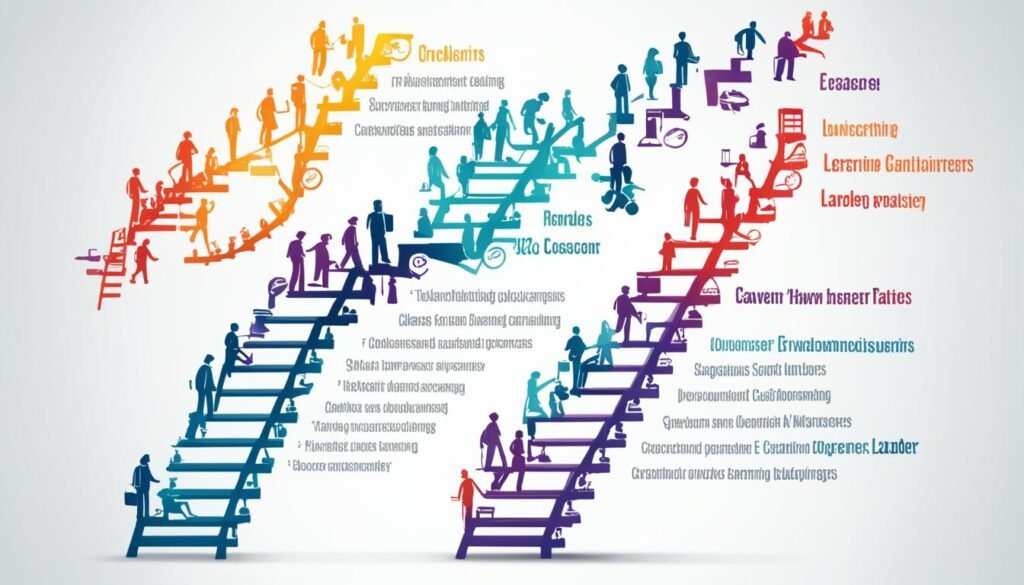Did you know that individuals with a master’s degree earn an average of 20% higher salaries compared to those with just a bachelor’s degree?
A master’s degree is not only a significant achievement but also a key factor for career growth, expertise, and higher earning potential. It plays a vital role in personal and professional development, equipping individuals with essential skills and knowledge that employers value.
By pursuing a master’s degree, you can enhance critical thinking, analytic abilities, time management, and presentation skills. You’ll become a leader and educator in your workplace, possessing in-depth knowledge in your field. This expanded expertise not only enhances your career prospects but also adds to your sense of accomplishment and recognition.
Moreover, a master’s degree offers excellent networking opportunities, allowing you to connect with professionals in your industry, collaborate on projects, and potentially secure new employment opportunities. It opens the doors to higher-level management positions and provides the flexibility for a career change.
In addition to career advancement, earning a master’s degree nurtures the mindset of being a lifelong learner. You’ll stay updated with the latest industry advancements, contribute to the field, and enhance your employability in a rapidly evolving job market.
Investing in a master’s degree is a wise decision that can significantly impact your future. It sets you apart from the competition, opens doors to new opportunities, and empowers you to become a respected professional in your field.
Key Takeaways:
- Individuals with a master’s degree earn an average of 20% higher salaries compared to those with only a bachelor’s degree.
- A master’s degree enhances critical thinking, analytic abilities, time management, and presentation skills.
- It expands your knowledge and positions you as a leader and educator in your workplace.
- Networking opportunities increase, leading to collaboration and potential employment.
- Earning a master’s degree nurtures the mindset of lifelong learning, contributing to the field and enhancing employability.
Advantages of a Master’s Degree
Obtaining a master’s degree offers numerous advantages that can propel your career to new heights. By pursuing advanced education in a specific field, you will gain in-depth knowledge and expertise that goes beyond what a bachelor’s degree provides.

A master’s degree equips you with the necessary tools to conduct research and analyze niche topics within your area of specialization. This enables you to stay updated on market trends, emerging technologies, and industry advancements, positioning you as a sought-after expert in your field.
Moreover, earning a master’s degree significantly expands your career opportunities. Employers value individuals with advanced degrees, as it demonstrates a higher level of commitment and mastery in the subject matter. This makes you more attractive to potential employers and opens doors to higher-level positions with greater responsibility and better compensation.
The career advancement opportunities that come with a master’s degree often result in higher earning potential. Research consistently shows that individuals with advanced degrees earn more over their careers compared to those with only a bachelor’s degree. The additional expertise and qualifications gained through a master’s degree enable you to command better salaries and enjoy greater financial success in your chosen profession.

Beyond the financial aspect, a master’s degree also enhances your reputation and credibility in your field. Employers recognize the value and dedication that a master’s degree represents, making you a trusted professional in your industry. This recognition can lead to increased opportunities for career growth and advancement.
In summary, pursuing a master’s degree offers you the advantage of in-depth knowledge, career opportunities, and higher earning potential. It equips you with specialized skills and expertise that set you apart from others in the job market. Additionally, the advanced education and qualifications gained through a master’s degree enhance your professional reputation and make you a valuable asset to employers.
Benefits of a Master’s Degree
Earning a master’s degree can have numerous benefits that can propel your career forward. Let’s explore some of the advantages that come with pursuing further education.
Enhanced Networking Skills
One of the significant benefits of pursuing a master’s degree is the opportunity to enhance your networking skills. Throughout your studies, you’ll have the chance to connect with professionals in your industry, whether it’s through guest lectures, workshops, or collaborative projects. Building these connections can lead to collaborations and potential employment opportunities, ultimately expanding your professional network.
Staying Competitive in the Job Market
In today’s highly competitive job market, having a master’s degree can give you a competitive edge. More employers are now seeking candidates with advanced degrees, valuing the specialized knowledge and skills they bring to the table. By obtaining a master’s degree, you demonstrate your commitment to continuous learning and staying ahead of industry trends, making you more attractive to potential employers.
Specialization and Niche Career Opportunities
Specialization is another advantage of pursuing a master’s degree. While a bachelor’s degree provides a foundational understanding of a field, a master’s degree allows you to delve deeper into a specific area of interest. This specialization not only gives you in-depth knowledge but also opens up niche career opportunities that may not be accessible with just a bachelor’s degree. Whether it’s focusing on a particular aspect of business, technology, or any other field, a master’s degree can equip you with the expertise needed to excel in your chosen specialty.

Preparation for Leadership Roles
A master’s degree sets you up for future leadership roles by providing you with the necessary skills and knowledge to succeed in managerial positions. The comprehensive curriculum and rigorous coursework challenge you to think critically, analyze complex problems, and develop effective strategies. This preparation enhances your leadership potential, preparing you to take on responsibilities and make informed decisions that contribute to the success of your organization.
Overall, pursuing a master’s degree offers numerous benefits. From enhancing networking skills and staying competitive in the job market to specializing in niche areas and preparing for leadership roles, the advantages are significant. By investing in further education, you not only broaden your knowledge but also position yourself for long-term career growth and success.
Conclusion
In conclusion, earning a master’s degree is crucial for advancing your career and achieving long-term success. By obtaining a master’s degree, you gain a competitive advantage in the job market, positioning yourself as a highly qualified candidate for lucrative opportunities. This higher level of education equips you with specialized knowledge and expertise that can set you apart from others in your field.
Additionally, a master’s degree offers more than just a boost in your career. It fosters a mindset of lifelong learning, encouraging you to stay updated with industry advancements and continuously expand your knowledge. This commitment to ongoing learning not only benefits your professional growth but also ensures that you remain relevant and adaptable in an ever-evolving job market.
Furthermore, pursuing a master’s degree provides you with invaluable networking opportunities. Through your studies, you can connect with industry professionals, potential mentors, and future colleagues who can help you navigate your career path and open doors to new possibilities. Developing these networking skills is essential for establishing a strong professional network that can support your career growth.
In summary, investing in a master’s degree is an investment in your future. It not only enhances your career prospects and earning potential but also nurtures a passion for lifelong learning and equips you with the skills necessary for leadership roles. By earning a master’s degree, you are positioning yourself for long-term success and ensuring that you remain at the forefront of your field.
Source Links
- https://asia.erau.edu/resources/blog/4-reasons-to-study-a-masters-degree
- https://potomac.edu/top-6-benefits-of-a-masters-degree/
- https://www.cn.edu/cps-blog/11-reasons-why-you-should-earn-a-masters-degree/
